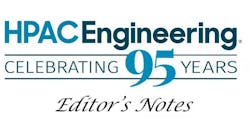In a recently published survey of 244 senior water-utility executives from 10 countries—Australia, Brazil, Canada, China, France, India, Russia, Spain, the United Kingdom, and the United States—conducted by The Economist magazine’s Economist Intelligence Unit, 35 percent of respondents said demand for water in their country is “highly likely” to outstrip supply by 2030, while 54 percent said the risk is “moderately likely,” Waterless Co., the Vista, Calif.-based manufacturer of no-flush urinals, reports.
Barriers to ensuring sufficient clean water supplies through 2030 include:
• Wasteful consumer behavior, cited by 45 percent of respondents.
• Insufficient capital resources, cited by 35 percent.
• Dwindling water resources attributed to climate change, cited by 34 percent.
• Tariffs insufficient to encourage investment, cited by 33 percent.
Forty-nine percent of the respondents said charging more for water needs to be considered to encourage conservation, while 38 percent said the cost of water should be held down to ensure fair access.
“The report also credits new technologies and innovations which are helping to reduce water consumption and use water more efficiently,” Klaus Reichardt, chief executive officer and founder of Waterless Co., said.
To download the report, click here.








